If you want to get really confused about how to eat to lose fat, build muscle, and stay healthy, go read a few of the latest-and-greatest bestselling books on dieting.
And if you want to add some misery to the confusion, start following them. Eliminate every food you actually enjoy from your diet. Try eating like a caveman. Starve yourself with “cleanses.” Swear off carbohydrates, keep protein intake low, and eat all the nuts and oils you can stomach.
Go ahead. But when you can’t take it anymore and you’re ready to take the red pill, come on back. I’ll be patiently waiting with the good news…
When you know what you’re doing, “dieting” is an enjoyable lifestyle, not a miserable, masochistic period of self-denial. You can lose fat eating foods you like and without ever feeling starved or deprived. You can build muscle without eating obscene amounts of calories and piling on body fat. You can “cheat” frequently and guilt-free.
In this article, I’m going to share with you seven insidious diet mistakes I’ve made throughout the years and that millions of other people make every day, basically guaranteeing they’ll never achieve the types of physiques they ultimately desire.
Table of Contents
+
Diet Mistake #1:
Thinking It’s All About “Clean Eating”
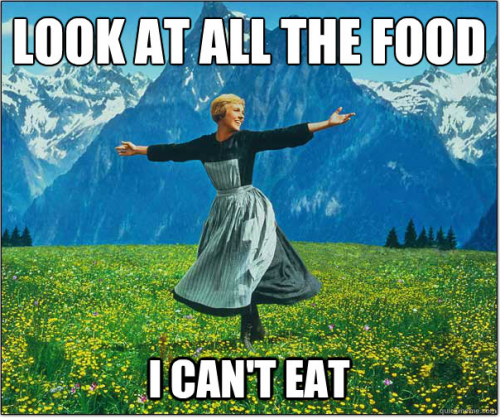
Oh the joys of clean eating!
I’m all for eating a bunch of nutritious foods, but if you think that’s all it takes to lose weight or build muscle, you’re mistaken.
Sure, those fundamentals include providing your body with enough vitamins and minerals through nutritious foods, but they include a lot more if our goal is to build muscle, get lean, and stay healthy.
Let’s talk fat loss first. Losing fat over time requires feeding your body less energy (via food) than it burns every day. We measure both the energy burned and eaten in calories or kilocalories.
When you do this, you are keeping your body in a state known as a “calorie deficit,” because it’s short on energy (you’re putting greater energy demands on it than you’re giving it fuel for).
It has two options, then, to stay alive: get the energy from somewhere or physically shut down. And fortunately, it has a ready store of energy made just for these circumstances: body fat stores. It begins breaking these stores down into cellular fuel to make up for the deficit, and voila, total fat mass decreases gram by gram, day after day, so long as a calorie deficit is maintained.
Now, here’s what most “clean eaters” don’t understand: “clean” calories count just as much as “dirty” calories when it comes to gaining or losing fat.
When we’re talking body composition, the calories from peas are no different than the calories from a Snickers bar. Sure, the latter is more calorie dense than the former and doesn’t fit well into a proper meal plan, but people that think that eating a bunch of peas is, in and of itself, conducive to weight loss whereas a Snickers bar isn’t don’t understand the simple mechanism explained above.
“Clean eating” guarantees nothing in the way of weight loss. Feed your body too much of the absolute “cleanest” foods every day and you simply won’t lose weight. Period.
And what about when you’re focusing on building muscle? Many people are surprised to learn that total calorie intake affects your body’s ability to build muscle just as much as its ability to reduce body fat percentage.
This biological factor known as “energy balance” is the key. Think of energy balance like your body’s energy checking account. A negative balance is a situation where your body is burning more energy than you’re feeding it (it’s in the red as far as energy goes). A positive balance, on the other hand, is a situation where your body is burning less energy than you’re feeding it (it’s in the black).
Now, as you already know, when a negative energy balance is sustained over time, total fat mass decreases. But this comes at a price: it also impairs the body’s ability to synthesize muscle proteins.
What is means is when you’re dieting to lose fat, your body simply can’t build muscle efficiently. This is why it’s commonly accepted that you can’t build muscle and lose fat, which is generally true but not always the case.
So, what this means is that when you want to maximize muscle growth, you must ensure you’re not in a calorie deficit. Instead, you must ensure that your body is in a slight calorie surplus, or a positive energy balance.
Diet Mistake #2:
Eating Too Much or Too Little For Your Goals
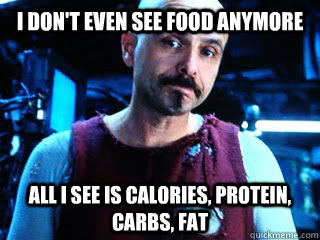
Surprise, asshole! Bet you never saw this coming!
This mistake may sound simplistic, but it’s one of the most insidious pitfalls that prevents millions of people from reaching their fitness goals. And it revolves around one simple fact…
If you don’t plan or track your food intake, and simply eat according to your appetite, your weight is likely to remain the same.
This “programming” is a good thing, actually, and helps your body accomplish its goal of homeostasis.
You see, your body doesn’t want to get fatter or leaner–it wants to maintain its current state, and to accomplish this it uses a complex system of mechanisms to carefully regulate both hunger and fullness as well as metabolic rate.
Changing your body composition–losing fat and/or building muscle–requires conscious efforts to under- or overeat, which are often uncomfortable at first. When you place your body in a calorie deficit to lose fat, expect to deal with some hunger and energy issues for the first week or two. When you place your body in calorie surplus to maximize muscle growth, expect to feel over-stuffed at first and, well, like you’re overeating.
Many people mistake these discomforts as signs that something is wrong, and revert back to “eating on instinct,” and then wonder why they can’t lose or gain weight easily.
The key is trusting the process and staying the course, and the result always follow.
Diet Mistake #3:
Starving Yourself
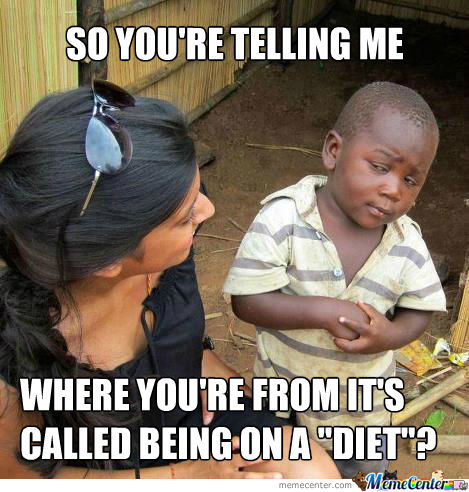
Click here to learn one “weird” trick Africans use to melt away belly fat!
The easiest way to see the scale go down is to simply starve yourself. And that’s why many people do it.
And by “starve yourself,” I mean feed your body less than 70% of the energy it burns every day (keep your body in a 30%+ calorie deficit). And the lower you go, the worse things get.
To put this in perspective, consider the following:
- A 140-lb woman exercising 3-5 times per week will burn approximately 1,600-1,700 calories per day.
If such a woman ate less than, ~1,100 calories per day, she would be entering the problem area.
- A 200-lb man exercising 3-5 times per week will burn approximately 2,500-2,600 calories per day.
Anything less than ~1,900 calories per day would be under-eating for such a man.
Many starvation diets have you eating anywhere from 30-50% of the energy you burn daily, and while they do induce weight loss, there’s a lot more to consider…
Much of the weight initially lost is water, which goes…and comes…very quickly.
When someone loses 6 pounds in a week, at least 50%, and as much as 75-80% of it is water, and could actually be gained back within 1-2 days of overeating.
You also lose muscle, and the less you eat, the more you lose.
As you lose muscle, your body not only begins to take on that amorphous “skinny fat look,” but your metabolism slows down, your bone health decreases, and your risk of disease increases.
You feel progressively worse and worse.
Your energy levels plummet, you battle intense food cravings, you become mentally clouded and even depressed, and more.
So, while severely restricting calories is great for losing weight quickly…it’s ultimately a bad way to go about losing weight.
Much better is to maintain a moderate caloric deficit of about 20% (eat about 80% of the energy your body burns every day).
By doing this, you’re able to lose 1-2 lbs of fat per week while preserving your metabolic health, energy levels, mental balance, and mood.
Diet Mistake #4:
Overlooking “Hidden Calories”
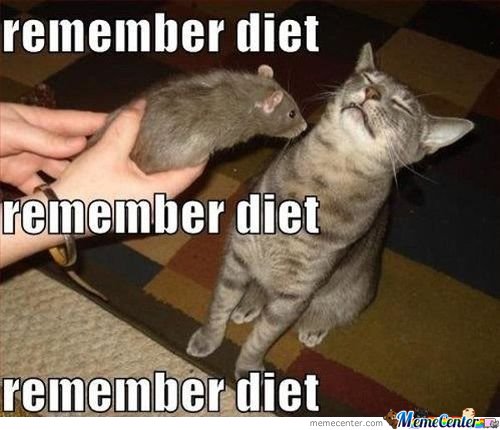
“I’ll just do some extra cardio.”
A huge, killer diet trap that many people fall into is eating a lot of “hidden calories” throughout the day. Then they wonder why they aren’t losing weight.
Hidden calories are those that you don’t realize are there and account for, such as the following:
- the 2 tablespoons of olive oil used to cook your dinner (240 calories),
- the 2 tablespoons of mayonnaise in your homemade chicken salad (200 calories),
- the 3 cubes of feta cheese on your salad (140 calories),
- the 3 tablespoons of cream in your coffee (80 calories), and
- the 2 pats of butter with your toast (70 calories).
These “little” additions add up every day and are by far the number-one reason why people fail to get results from what would otherwise be a proper dietary regimen. There just isn’t a large margin for error when you’re trying to maintain a moderate calorie deficit every day.
For example, let’s say you’re looking to maintain a 500-calorie deficit every day to lose about a pound of fat per week, but you accidentally eat 400 more calories than you should have, leaving you in a 100-calorie deficit instead. It’ll now take a month or longer to lose that pound of fat. It’s that simple.
It might seem paranoid to be careful about how many tablespoons of ketchup you have in a day, but if you watch your calories that closely when dieting for fat loss, you’re guaranteed to get results.
The best way to avoid hidden calories is to prepare your food yourself so you know exactly what went into it. For most people, this just means preparing a lunch to bring to the office, as they usually eat breakfast and dinner at home.
Diet Mistake #5:
Eating Too Little Protein
Whenever I talk about eating enough protein, I can’t help but think of this video:
And then I want a protein shake, hahah.
Seriously though–here’s a dietary guideline that you can take to the bank:
Eat too little protein and you’ll always have trouble building muscle, even in a calorie surplus, and preserving it when in a calorie deficit.
You may already understand the physiological reasons for this, but I want to give a brief summary just to make sure.
In the body, a protein is a special type of molecule that is comprised of substances known as amino acids. Think of amino acids as the “building blocks” of proteins–without the requisite amino acids, the body can’t create protein molecules.
There are many types of proteins in the body, and they perform a wide variety of functions ranging from the replication and repair of DNA, to cell signaling (insulin is a protein, for instance), to the formation of tissues and other substances like hair and nails, and more.
The building of “muscle proteins” (the types of protein molecules that our muscles are made of) requires a variety of amino acids, some of which must be obtained from food (these are known as “essential” amino acids).
When you eat a food that contains protein, your body breaks the protein molecules in the food down into the amino acids they’re comprised of, and then uses those amino acids to build its own proteins.
If you eat too few grams of protein every day, your body can become deficient in the amino acids it needs to build and repair muscle, and thus, muscle growth becomes impaired.
The body has certain protein needs even if you don’t exercise. Remember that every day cells are dying and being regenerated, and this requires amino acids. When you do exercise, however, the body needs even more amino acids to repair damaged muscle fibers and, depending on what you’re doing, grow them larger.
Now, this all sounds good in theory, and we all know bodybuilders eat large amounts of protein, but what does the scientific research say?
Research shows that high-protein diets…
- are more effective for building muscle
- are more effective at reducing body fat, including abdominal fat in particular,
- help preserve lean mass
- increase satiety, helping you avoid hunger pangs and cravings.
A low-protein diet, on the other hand, is great for accelerating muscle loss while in a caloric deficit.
The abundance of research available on high-protein dieting makes it very clear that it’s simply a superior way to diet for weight loss, and especially if you’re exercising as well.
How much protein should you be eating, then?
Research has shown that protein should comprise approximately 30% of your daily calories, but going as high as 40-50% is okay as well. For most people, that comes out to be about 1 – 1.2 grams of protein per pound of body weight.
(In case you’re wondering if a high-protein diet is bad for your kidneys, this myth has been thoroughly debunked.)
Diet Mistake #6:
Eating Too Little Carbohydrate
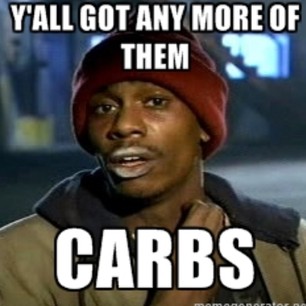
The low-carb diet feels…
Yes, you read that correctly. I’m advocating eating carbohydrate. And no, I’m not a neo-Nazi and I don’t sacrifice babies to Moloch.
Seriously though, despite its current popularity, low-carb dieting sucks and is not only unnecessary for most people, but downright counter-productive.
If you find that statement blasphemous, give me a minute to explain…
You don’t lose fat faster on a low-carb diet.
That statement is basically blasphemous these days, but the general advice of going on a low-carb diet to maximize fat loss is scientifically bankrupt.
There are about 20 studies that low-carb proponents bandy about as definitive proof of the superiority of low-carb dieting for weight loss. This, this, and this are common examples. If you simply read the abstracts of these studies, low-carb dieting definitely seems more effective, and this type of glib “research” is what most low-carbers base their beliefs on.
But there’s a big problem with many of these studies, and it has to do with protein intake.
The problem is the low-carb diets in these studies invariably contained more protein than the low-fat diets. Yes, one for one…without fail.
In many cases, the low-fat groups were given less protein than even the RDI of .8 grams per kg of body weight, which is just woefully inadequate for weight loss purposes. Research has shown that even double and triple those (RDI) levels of protein intake isn’t enough to fully prevent the loss of lean mass while restricting calories for fat loss.
So what we’re actually looking at in these studies is a high-protein, low-carbohydrate diet vs. low-protein, high-fat diet, and the former wins every time. But we can’t ignore the high-protein part and say it’s more effective because of the low-carb element.
In fact, better designed and executed studies prove the opposite: that when protein intake is high, low-carb dieting offers no especial weight loss benefits.
There are four studies I know of that meet these criteria and gee whiz look at that…when protein intake is high and matched among low-carb and high-carb dieters, there is no significant difference in weight loss.
The bottom line is so long as you maintain a proper calorie deficit and keep your protein intake high, you’re going to maximize fat loss while preserving as much lean mass as possible. Going low-carb as well won’t help you lose more weight.
You build less muscle on a low-carb diet.
When you reduce your carbohydrate intake, you reduce the amount of glycogen stored in the muscles. This, in turn, compromises your performance in the gym–you can expect a dramatic reduction in both muscle endurance and strength, which then limits the amount of progressive overload you can subject your muscles to in those workouts. (And less progressive overload in workouts = less muscle growth over time.)
There are other downsides to low muscle glycogen levels.
Research conducted by scientists at Ball State University found that when muscle glycogen levels are low, post-workout signaling related to muscle growth is impaired. This, by the way, is especially unwanted when you’re dieting for weight loss because a calorie restriction alone already impairs your body’s ability to synthesize proteins.
In athletes, a low-carb diet has been shown to increase cortisol and reduce testosterone levels. This too is particularly problematic when you’re restricting calories, which also reduces anabolic hormone levels.
So, we already know that a low-carb diet won’t help us lose fat faster, but as you now see, it’s looking pretty damn ugly for us weightlifters looking to get lean. It looks like all a low-carb diet does is make our workouts suck and speed up muscle loss.
This isn’t just theory, either.
A study conducted by researchers at the University of Rhode Island looked at how low- and high-carbohydrate intakes affected exercise-induced muscle damage, strength recovery, and whole body protein metabolism after a strenuous workout.
The result was the subjects on the low-carbohydrate diet (which wasn’t all that low, actually—about 226 grams per day, versus 353 grams per day for the high-carbohydrate group) lost more strength, recovered slower, and showed lower levels of protein synthesis.
In this study, researchers at McMaster University compared high- and low-carbohydrate dieting with subjects performing daily leg workouts. They found that those on the low-carbohydrate diet experienced higher rates of protein breakdown and lower rates of protein synthesis, resulting in less overall muscle growth than their higher-carbohydrate counterparts.
All this is why I never drop my carbohydrate intake lower than about .8 grams per pound of body weight when cutting (and yes I get to 6% body fat eating this many carbs per day), and I’ll go as high as 2 to 2.5 grams per pound when bulking.
The bottom line on low-carb dieting.
Despite my general distaste for low-carb dieting, I actually do recommend it in certain cases.
For instance, if someone is severely overweight, his insulin sensitivity is going to be poor, and his body may do better with a lower carb diet than I recommend above. If someone is sedentary (no regular exercise), he too would be better served by a lower-carb diet because his body simply doesn’t need the abundance of carbohydrate energy for anything.
That said, if you exercise regularly, and especially with resistance training, a low-carb diet will do nothing for you but slow muscle growth when “bulking” and accelerate muscle loss when “cutting.”
Diet Mistake #7:
Taking “Cheating” Too Far
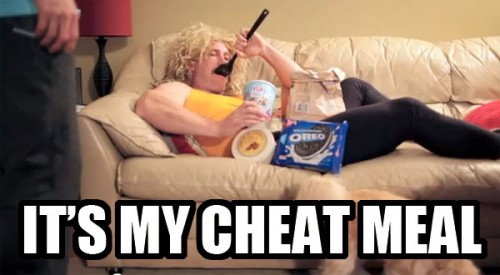
I EARNED THIS
Now that you know that “cheating” on a diet doesn’t mean eating a food deemed “unclean,” we can get at its real meaning:
“Cheating” on your diet has nothing to do with what you eat–it’s simply erasing your calorie deficit or adding to your surplus by overeating.
And you can accomplish this by slightly overeating every day or by going buck wild one or two days per week, which can then add back some or all the fat you lost during the week (effectively reducing or erasing your calorie deficit for the week) or cause you to gain too much fat too quickly if you’re in a calorie surplus every day.
If you’re dieting for fat loss (maintaining a weekly calorie deficit), I recommend having a moderate cheat meal every week. It’s a nice psychological boost and, depending on where you’re at in terms of body fat percentage, it can help keep the weight loss going.
Notice I said cheat MEAL, though. And moderate. Not a cheat DAY or an all-out binge meal, because either can undo some or all of a week’s worth of fat loss (super high-fat meals with alcohol are the absolute worst).
If you’re dieting for muscle growth (maintaining a weekly calorie surplus), I also recommend having a moderate cheat meal every week, but I also recommend that you avoid dramatically spiking your calorie intake for that day.
The number one mistake that people trying to “bulk” make is simply using it as a license to eat more or less whatever they want, and the result is rapid fat gain that in turn impairs muscle growth, partially defeating the point of being in a calorie surplus in the first place.
When you’re in a calorie surplus and are cheating, you can end the day a few hundreds calories above your normal daily intake, but don’t go crazy.
If you need to, you can even reduce your carbohydrate and fat intake throughout the day to “save up” calories for the larger meal and thus keep your overall intake for the day in a reasonable range.
Stop Making These Diet Mistakes and Your Body Will Change
Like anything, proper dieting doesn’t require utter perfection to get results. It just requires that you do enough of the important things right.
There are, of course, many other potential diet mistakes you can make, but they’re inconsequential compared to the seven outlined here. These are the key, “make or break” factors of dieting that you simply can’t screw around with.
Stop making these mistakes and get these things right, and you’ll never fret over dieting again. You’ll learn to use it as a tool for changing body composition as you desire, and you’ll gain freedom and control over what and how you eat.
What are your thoughts on these diet mistakes? Have anything else to share? Let me know in the comments below!
Scientific References +
- Qatanani, M., & Lazar, M. A. (2007). Mechanisms of obesity-associated insulin resistance: Many choices on the menu. In Genes and Development (Vol. 21, Issue 12, pp. 1443–1455). Genes Dev. https://doi.org/10.1101/gad.1550907
- Cangemi, R., Friedmann, A. J., Holloszy, J. O., & Fontana, L. (2010). Long-term effects of calorie restriction on serum sex-hormone concentrations in men. Aging Cell, 9(2), 236–242. https://doi.org/10.1111/j.1474-9726.2010.00553.x
- Lane, A. R., Duke, J. W., & Hackney, A. C. (2010). Influence of dietary carbohydrate intake on the free testosterone: Cortisol ratio responses to short-term intensive exercise training. European Journal of Applied Physiology, 108(6), 1125–1131. https://doi.org/10.1007/s00421-009-1220-5
- Pasiakos, S. M., Vislocky, L. M., Carbone, J. W., Altieri, N., Konopelski, K., Freake, H. C., Anderson, J. M., Ferrando, A. A., Wolfe, R. R., & Rodriguez, N. R. (2010). Acute energy deprivation affects skeletal muscle protein synthesis and associated intracellular signaling proteins in physically active adults. Journal of Nutrition, 140(4), 745–751. https://doi.org/10.3945/jn.109.118372
- Creer, A., Gallagher, P., Slivka, D., Jemiolo, B., Fink, W., & Trappe, S. (2005). Influence of muscle glycogen availability on ERK1/2 and Akt signaling after resistance exercise in human skeletal muscle. Journal of Applied Physiology, 99(3), 950–956. https://doi.org/10.1152/japplphysiol.00110.2005
- American College of Sports Medicine. (n.d.). American College of Sports Medicine position stand. Progression models in resistance training for healthy adults - PubMed. Retrieved August 4, 2020, from https://pubmed.ncbi.nlm.nih.gov/19204579/
- GG, H., MJ, L., LB, M., & MH, S. (2003). Carbohydrate supplementation and resistance training. Journal of Strength and Conditioning Research, 17(1). https://doi.org/10.1519/1533-4287(2003)017<0187:CSART>2.0.CO;2
- Skein, M., Duffield, R., Kelly, B. T., & Marino, F. E. (2012). The effects of carbohydrate intake and muscle glycogen content on self-paced intermittent-sprint exercise despite no knowledge of carbohydrate manipulation. European Journal of Applied Physiology, 112(8), 2859–2870. https://doi.org/10.1007/s00421-011-2253-0
- Thomson, C. A., Stopeck, A. T., Bea, J. W., Cussler, E., Nardi, E., Frey, G., & Thompson, P. A. (2010). Changes in body weight and metabolic indexes in overweight breast cancer survivors enrolled in a randomized trial of low-fat vs. reduced carbohydrate diets. Nutrition and Cancer, 62(8), 1142–1152. https://doi.org/10.1080/01635581.2010.513803
- Boling, C. L., Westman, E. C., & Yancy, W. S. (2009). Comparison of weight-loss diets. The New England Journal of Medicine, 360(21), 2247; author reply 2247-8. https://doi.org/10.1056/NEJMc096106
- Phillips, S. A., Jurva, J. W., Syed, A. Q., Syed, A. Q., Kulinski, J. P., Pleuss, J., Hoffmann, R. G., & Gutterman, D. D. (2008). Benefit of low-fat over low-carbohydrate diet on endothelial health in obesity. Hypertension, 51(2), 376–382. https://doi.org/10.1161/HYPERTENSIONAHA.107.101824
- Carol S Johnston 1 , Sherrie L Tjonn, Pamela D Swan, Andrea White, Heather Hutchins, B. S. (n.d.). Ketogenic low-carbohydrate diets have no metabolic advantage over nonketogenic low-carbohydrate diets - PubMed. Retrieved August 4, 2020, from https://pubmed.ncbi.nlm.nih.gov/16685046/
- Mettler, S., Mitchell, N., & Tipton, K. D. (2010). Increased protein intake reduces lean body mass loss during weight loss in athletes. Medicine and Science in Sports and Exercise, 42(2), 326–337. https://doi.org/10.1249/MSS.0b013e3181b2ef8e
- Donald K Layman 1 , Richard A Boileau, Donna J Erickson, James E Painter, Harn Shiue, Carl Sather, D. D. C. (n.d.). A reduced ratio of dietary carbohydrate to protein improves body composition and blood lipid profiles during weight loss in adult women - PubMed. Retrieved August 4, 2020, from https://pubmed.ncbi.nlm.nih.gov/12566476/
- Samaha, F. F., Iqbal, N., Seshadri, P., Chicano, K. L., Daily, D. A., McGrory, J., Williams, T., Williams, M., Gracely, E. J., & Stern, L. (2003). A low-carbohydrate as compared with a low-fat diet in severe obesity. New England Journal of Medicine, 348(21), 2074–2081. https://doi.org/10.1056/NEJMoa022637
- Volek, J. S., Sharman, M. J., Gómez, A. L., Judelson, D. A., Rubin, M. R., Watson, G., Sokmen, B., Silvestre, R., French, D. N., & Kraemer, W. J. (2004). Comparison of energy-restricted very low-carbohydrate and low-fat diets on weight loss and body composition in overweight men and women. Nutrition and Metabolism, 1, 13. https://doi.org/10.1186/1743-7075-1-13
- Yancy, W. S., Olsen, M. K., Guyton, J. R., Bakst, R. P., & Westman, E. C. (2004). A Low-Carbohydrate, Ketogenic Diet versus a Low-Fat Diet to Treat Obesity and Hyperlipidemia: A Randomized, Controlled Trial. Annals of Internal Medicine, 140(10). https://doi.org/10.7326/0003-4819-140-10-200405180-00006
- E Brändle 1 , H G Sieberth, R. E. H. (n.d.). Effect of chronic dietary protein intake on the renal function in healthy subjects - PubMed. Retrieved August 4, 2020, from https://pubmed.ncbi.nlm.nih.gov/8933120/
- Lambert, C. P., Frank, L. L., & Evans, W. J. (2004). Macronutrient considerations for the sport of bodybuilding. In Sports Medicine (Vol. 34, Issue 5, pp. 317–327). Sports Med. https://doi.org/10.2165/00007256-200434050-00004
- Wycherley, T. P., Moran, L. J., Clifton, P. M., Noakes, M., & Brinkworth, G. D. (2012). Effects of energy-restricted high-protein, low-fat compared with standard-protein, low-fat diets: A meta-analysis of randomized controlled trials. American Journal of Clinical Nutrition, 96(6), 1281–1298. https://doi.org/10.3945/ajcn.112.044321
- Halton, T. L., & Hu, F. B. (2004). The effects of high protein diets on thermogenesis, satiety and weight loss: A critical review. Journal of the American College of Nutrition, 23(5), 373–385. https://doi.org/10.1080/07315724.2004.10719381
- James W Krieger 1 , Harry S Sitren, Michael J Daniels, B. L.-H. (n.d.). Effects of variation in protein and carbohydrate intake on body mass and composition during energy restriction: a meta-regression 1 - PubMed. Retrieved August 4, 2020, from https://pubmed.ncbi.nlm.nih.gov/16469983/
- Clifton, P. M., Bastiaans, K., & Keogh, J. B. (2009). High protein diets decrease total and abdominal fat and improve CVD risk profile in overweight and obese men and women with elevated triacylglycerol. Nutrition, Metabolism and Cardiovascular Diseases, 19(8), 548–554. https://doi.org/10.1016/j.numecd.2008.10.006
- Phillips, S. M., & van Loon, L. J. C. (2011). Dietary protein for athletes: From requirements to optimum adaptation. Journal of Sports Sciences, 29(SUPPL. 1). https://doi.org/10.1080/02640414.2011.619204
- Robert R Wolfe. (n.d.). The underappreciated role of muscle in health and disease - PubMed. Retrieved August 4, 2020, from https://pubmed.ncbi.nlm.nih.gov/16960159/
- G R Hunter 1 , R L Weinsier, B A Gower, C. W. (n.d.). Age-related decrease in resting energy expenditure in sedentary white women: effects of regional differences in lean and fat mass - PubMed. Retrieved August 4, 2020, from https://pubmed.ncbi.nlm.nih.gov/11157332/
- Durrant, M. L., Garrow, J. S., Royston, P., Stalley, S. F., Sunkin, S., & Warwick, P. M. (1980). Factors influencing the composition of the weight lost by obese patients on a reducing diet. British Journal of Nutrition, 44(3), 275–285. https://doi.org/10.1079/bjn19800042
- Henry, R. R., Wiest-Kent, T. A., Scheaffer, L., Kolterman, O. G., & Olefsky, J. M. (1986). Metabolic consequences of very-low-calorie diet therapy in obese non-insulin-dependent diabetic and nondiabetic subjects. Diabetes, 35(2), 155–164. https://doi.org/10.2337/diab.35.2.155
- Klok, M. D., Jakobsdottir, S., & Drent, M. L. (2007). The role of leptin and ghrelin in the regulation of food intake and body weight in humans: A review. In Obesity Reviews (Vol. 8, Issue 1, pp. 21–34). Obes Rev. https://doi.org/10.1111/j.1467-789X.2006.00270.x
- Zito, C. I., Qin, H., Blenis, J., & Bennett, A. M. (2007). SHP-2 regulates cell growth by controlling the mTOR/S6 kinase 1 pathway. Journal of Biological Chemistry, 282(10), 6946–6953. https://doi.org/10.1074/jbc.M608338200










